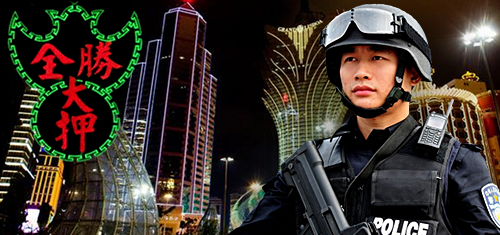 Beijing’s new crackdown on UnionPay card abuse could take a toll on Macau’s pawnshops, which would have a spillover effect on the city’s casino gaming industry.
Beijing’s new crackdown on UnionPay card abuse could take a toll on Macau’s pawnshops, which would have a spillover effect on the city’s casino gaming industry.
Last week saw China announce a two-pronged attack on illicit use of the UnionPay system. Beijing is taking steps to ensure that all mobile scanning devices are properly registered, while Macau authorities have announced the real-time monitoring of transactions at high-risk merchants, such as pawnshops and high-end jewelry and watch retailers, particularly those adjacent to casinos.
Macau’s pawnshops are infamous for deriving a significant chunk of their business volume through bogus transactions, in which cash advances are disguised as product purchases. Other scams involve the actual purchase of a high-value item via UnionPay, after which the customer returns the items in exchange for cash (minus the merchant’s commission).
Deutsche Bank analyst Karen Tang estimates that such transactions account for between 10% and 15% of all cash accessed by gamblers in Macau. Tang believes this could account for 10% of all VIP gambling activity, and up to 30% of all premium mass activity (high-stakes players who don’t rely on junket operators to provide cash).
Should Beijing’s new crackdown succeed in choking off this money supply, the effect on Macau’s fragile casino economy could be significant. Tang suggested that Melco Crown Entertainment and MGM China would suffer most from the resulting premium mass decline, while Galaxy Entertainment Group and Wynn Macau could take an earnings hit of between 5% and 7% from reduced VIP play.
The jewelry shop owners Tang spoke with said they planned to reduce the number of “large amount transactions” they permit in the hopes of staying under the Macau authorities’ radar. But given that we are now heading into the third year of China’s crackdown on various aspects of the casino industry – a process that appears to be expanding, not contracting – these owners’ hopes of an imminent return to the good old days seems naïve if not downright foolish.
In a somewhat related note, Macau’s Financial Intelligence Office reported a 3.8% rise in the number of suspected money laundering cases in the first half of 2015. There were a total of 910 such cases through the end of June, of which 60 cases were referred to the Public Prosecutions Office for further investigation.
The H1 figures put 2015 on pace to come close to breaking the annual record of 1,840 suspected money laundering cases set in 2012. The gaming industry was the source of nearly 75% of 2015’s cases, more than triple the financial industry’s 24%.
